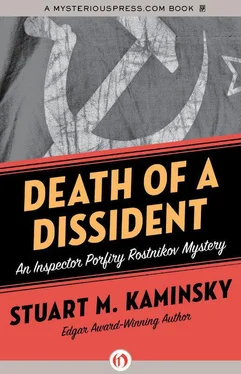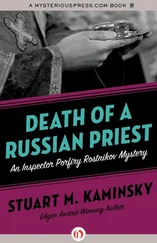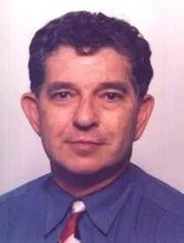Stuart Kaminsky - Death of a Dissident
Здесь есть возможность читать онлайн «Stuart Kaminsky - Death of a Dissident» весь текст электронной книги совершенно бесплатно (целиком полную версию без сокращений). В некоторых случаях можно слушать аудио, скачать через торрент в формате fb2 и присутствует краткое содержание. Год выпуска: 2012, ISBN: 2012, Жанр: Полицейский детектив, на английском языке. Описание произведения, (предисловие) а так же отзывы посетителей доступны на портале библиотеки ЛибКат.
- Название:Death of a Dissident
- Автор:
- Жанр:
- Год:2012
- ISBN:9781453266298
- Рейтинг книги:4 / 5. Голосов: 1
-
Избранное:Добавить в избранное
- Отзывы:
-
Ваша оценка:
- 80
- 1
- 2
- 3
- 4
- 5
Death of a Dissident: краткое содержание, описание и аннотация
Предлагаем к чтению аннотацию, описание, краткое содержание или предисловие (зависит от того, что написал сам автор книги «Death of a Dissident»). Если вы не нашли необходимую информацию о книге — напишите в комментариях, мы постараемся отыскать её.
Death of a Dissident — читать онлайн бесплатно полную книгу (весь текст) целиком
Ниже представлен текст книги, разбитый по страницам. Система сохранения места последней прочитанной страницы, позволяет с удобством читать онлайн бесплатно книгу «Death of a Dissident», без необходимости каждый раз заново искать на чём Вы остановились. Поставьте закладку, и сможете в любой момент перейти на страницу, на которой закончили чтение.
Интервал:
Закладка:
“Inspector,” said Karpo, opening his eyes.
“How do you assess your progress, Karpo?”
Something approaching a sad smile played on Rostnikov’s face. His coat collar, the left side, was awkwardly tucked under while his right stuck out at an angle. He was, Karpo knew, not a man dedicated to appearances.
“My eyes were closed not because of particular pain,” explained Karpo softly, “but because I am making all necessary efforts to allow my body to recover. I wish to get back to duty within a week.”
“The possibility exists,” said Rostnikov, sitting on the edge of the bed to ease the pressure on his leg, “that you will lose that arm.”
“I do not intend for that to happen,” said Karpo without emotion.
“Emil Karpo, you may have no choice,” Rostnikov responded masking quite distinct emotion. “The doctors are not going to consult with you.”
“It is out of the question,” Karpo said.
“There have been one-armed inspectors,” Rostnikov said, leaning over.
“That was during the war against the Germans, and only Baulfetroya in Kiev,” said Karpo, closing his eyes.
“I’m glad you came up with that. I had no examples in mind,” Rostnikov answered. The thought chain had struck like lightning. Kiev, where his son Iosef had been stationed. Now Afghanistan. The murder of one child and murder by another.
Karpo sensed the change in his visitor and opened his eyes to see Rostnikov looking at a spot of nothing on the brown woolen blanket.
“I’ll not lose the arm,” Karpo said. “You have work. I’ll be all right.”
“Are you dismissing me, Sergeant Karpo?” Rostnikov rallied.
“I am relieving you of responsibility,” said Karpo.
“I accept,” smiled Rostnikov.
“What has happened to Kroft?” Karpo added as Rostnikov rose to leave.
“Imprisoned. The trial will wait till you are well enough to testify. So the faster you recover, the faster you can return to battling enemies of the state like Kroft.”
“He saved my life,” said Karpo, his eyes closed again.
“So?”
“I think that might be taken into account.”
“Do you want it to be? In another sense, you might not be here if it were not for him.”
“It was not his fault that I got out of bed with a bad arm to pursue him. He could have waited another day or two,” said Karpo. “He is a confusing criminal in some ways.”
“I’ve seen many like him,” said Rostnikov, “but he did tell me something that may help.”
“In the Granovsky murder?” Karpo said, trying to reopen his eyes and failing.
“No, about the proper grip for a dead lift. Don’t worry about it. I’ll talk to you tomorrow.”
By the time Rostnikov got back to his office in Petrovka, Tkach had been gone almost forty minutes. The young officer had been wise enough to put the time in the right-hand corner of the message. Rostnikov called Maxim and asked if there was any other information. He had the impulse to get back in his car and race to Lvov’s apartment, but he checked himself. He could not really help. With his leg he was too slow and conspicuous to follow anyone around Moscow. Tkach would have to handle this himself.
At 5:15 a call came. Rostnikov then decided that he would have to tell Sarah that Iosef was in Afghanistan. It was her right to know and worry, and if he did not tell her and she found out that he knew all along, she would hold it against him. She would try not to, but it would be there. It had happened before for things of much less importance. The call had been brief. Colonel Drozhkin wanted to see him at K.G.B. headquarters at seven the following morning.
Tkach had arrived in front of Simon Lvov’s apartment just in time. He had been standing in the doorway of an apartment building across the street from Lvov’s for no more than five minutes when the figure of a tall old man in a long dark coat emerged. Although Tkach was more than one hundred yards from Lvov, the old man was unmistakable. His tall, stooped form and his thin face with horn-rimmed glasses were clear from the distance, and traffic was very light so that nothing stood in the way.
It seemed quite early to Tkach. Lvov was giving himself a full hour. The place must either be quite far, or Lvov was planning to make a stop first. It was also possible that Lvov, who had been a known dissident, was well aware of the possibility of his being followed and wanted to give himself ample time to lose his follower.
Keeping up with Lvov proved to be no great problem for Tkach, at least at first. Lvov boarded a bus and Tkach, his face covered as if to keep out the chill wind, boarded behind him. Lvov rode without looking about and got off not far from Red Square. The crowds were thick on the relatively pleasant sunny day, and Tkach had to close the distance between himself and the old man. In the crowd in front of the Lenin mausoleum, Tkach confused a pair of tall, dark clad figures before him but managed to select the right quarry with little trouble. Lvov walked slowly to the Lobnoye Mseto, the four-hundred-year-old white stone platform where the Tsars had performed their executions. From there Lvov crossed Kuibyshev Street and entered G.U.M., the State Department Store, the biggest and most crowded store in Moscow. In Stalin’s day it had been a massive office building, but in 1953, with Stalin’s departure, it had been returned to its commercial use, a huge department store with curved display windows on the main floor, many small shops and a massive press of 350,000 customers each day. Tkach muscled his way past afternoon tourists and old women with white babushkas to keep up with Lvov, who moved slowly but steadily through the crowds without really pausing to look in any windows.
It became clear to Tkach that the old man was diligently and intelligently trying to lose him. The moment of truth came at one of the first level overpasses between the store’s sections. Lvov paused at the dark metal railing to look up at the arcade’s glass ceiling several stories above. He seemed to be in no hurry. Tkach stopped and leaned against a wall on one side of the overpass. A crowd of people surged out of a store and moved onto the bridge toward Tkach, coming between himself and Lvov who remained along the rail and moved quickly to the other side. Tkach considered forcing his way over the overpass but realized that he would surely lose Lvov if he did so. The alternative was to anticipate where the old man was going. He could see Lvov’s thin figure above the crowd moving away and Tkach guessed and acted. He went back into the store behind him, found the stairway and ran to the lower level. On the main floor of the arcade he ran through the window-shopping crowds and headed to the far exit. A tall, thin figure was just touching the bottom of the steps, and the panting Tkach slowed down for an instant, but only for an instant. The figure was not Lvov.
He looked around frantically and headed for the stairs pushing people out of the way. A very fat man said something in an angry hiss that might have been English, but Sasha didn’t pause. He didn’t even care now if he ran headlong into Lvov as long as he could catch sight of him, but he could not find the thin figure he sought.
There was no help for it. He would have to return to Petrovka and report to Rostnikov. He assumed the next step would be for Rostnikov himself to pay a visit to Lvov after Lvov’s meeting with Malenko.
CHAPTER TEN
It was no more than two minutes after four when Simon Lvov returned to his apartment, the apartment where, no more than a month before, Ilyusha Malenko, quite drunk, had accidentally broken a window. Lvov had led the young policeman away, easily lost him, and had returned almost on the dot. He had left his door open and the lights off.
Читать дальшеИнтервал:
Закладка:
Похожие книги на «Death of a Dissident»
Представляем Вашему вниманию похожие книги на «Death of a Dissident» списком для выбора. Мы отобрали схожую по названию и смыслу литературу в надежде предоставить читателям больше вариантов отыскать новые, интересные, ещё непрочитанные произведения.
Обсуждение, отзывы о книге «Death of a Dissident» и просто собственные мнения читателей. Оставьте ваши комментарии, напишите, что Вы думаете о произведении, его смысле или главных героях. Укажите что конкретно понравилось, а что нет, и почему Вы так считаете.












